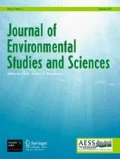Abstract
Several holistic urban concepts point to the importance of taking an integrated resources approach in the city. The reason for this is obvious: resource flows are highly interconnected. Think for instance of the high water, energy, and land input for most of our food production, or the vast energy input in water desalination processes. In addition, taking a single-resource approach to cities, mostly done for energy, often leads to negative feedbacks on other resource flows. Carbon-neutral cities do not usually account for higher material in- and output for insulation, efficient appliances, or renewable energy systems, and most often do not even account for the embodied energy of these extra material flows. If, on top of that, carbon offsetting is allowed, one should definitely question if the claimed carbon neutrality weighs against all the externalities of realizing this claim. Therefore, on a conceptual basis, an integrated approach towards resources makes a lot of sense. It is, however, in the translation from theory to practice that such concepts often get stuck. One of the obvious obstacles with respect to hindering progress in implementation is the difficulty to realize cooperation between institutions, experts, and bureaucrats that are neatly organized in a sectorial way, the famous silo effect. Other challenges that are often mentioned are short-termism, lack of mandate and financing of local governments and corruption (WFC 2014). While these are well-known obstacles, I will discuss some often missed elements that are crucial for a successful implementation of holistic urban concepts aiming at sustainable cities and regions. These elements are: transformative change, transdisciplinarity, performance measurability, and demand-side change.
Similar content being viewed by others
References
Brugmann J (2009) Welcome to the urban revolution: how cities are changing the world. Penguin Group (Canada), Toronto
Brugmann J, Mohareb E (2012) The Productive City. Defining the practices of urban ecological development., Paper presetnted at the 8th World Congress of ICLEI-Local Governments of Sustainability, Belo Horizonte, June 14–17, 2012
Campbell A (2008) Food, energy, water: conflicting in securities (and the rare win-wins offered by soil stewardship). J Soil Water Conserv 63:149A–151A
DEFRA (2008) A framework for pro-environmental behaviours. Department for Environment, Food and Rural Affairs, London
Guadalupe C (2013) The Incomplete City Strikes Back. Interview with Saskia Sassen., DAMN°39 magazine, pp. 64–68
Klein N (2008) The shock doctrine. Metropolitan Books, New York
McDonough W, Braungart M (2002) Cradle to cradle: remaking the way we make things. North Point Press, New York
Peñalosa E (2007) Politics, power, cities. In: Burdett R, Sudjic D (eds) The endless city. Phaidon Press Ltd, London
Rovers R (2012) Resources are not equal: exploring ranking not weighting. Int J Sustain Build Technol Urban Dev 3:270–276
SENPLADES (2010) The Republic of Ecuador. National Development Plan. National Plan for Good Living 2009–2013: Building a Plurinational and Intercultural State. Summarized Version. Secretaria Nacional de Planificacion y Desarollo, Quito, Ecuador
Thaler R, Sunstein C (2009) Nudge: improving decisions about health, wealth, and happiness. Penguin, USA
Warde A (2013) Sustainable Consumption and Behaviour Change. Retrieved March 24, 2014 from http://www.discoversociety.org/sustainable-consumption-and-behaviour-change/
WFC (2014) Regenerative Urban Development: a roadmap to the city we need. Report document of the 3rd Future of Cities Forum, Hamburg, Germany, 4–7 September, 2013
Zurick D (2006) Gross national happiness and environmental status in Buthan. Geogr Rev 96:657–681
Author information
Authors and Affiliations
Corresponding author
Rights and permissions
About this article
Cite this article
De Flander, K. Operationalizing holistic urban concepts. J Environ Stud Sci 7, 141–144 (2017). https://doi.org/10.1007/s13412-014-0193-9
Published:
Issue Date:
DOI: https://doi.org/10.1007/s13412-014-0193-9




